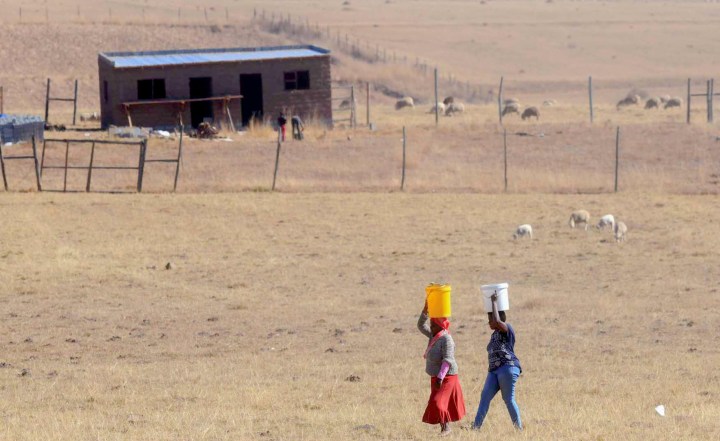ISS TODAY OP-ED
Gender inequality forcing African women to bear brunt of climate change storm

Despite being at the forefront of local adaptation strategies, women are ignored in most climate actions.
Women are disproportionately impacted by climate change due to gender inequalities and gender roles and responsibilities. They are 14 times more likely than men to die in a climate catastrophe and make up 80% of people displaced due to climate change.
The international community has made strides in recognising that climate action must consider gender equality. But this year’s United Nations Climate Change Conference (COP27) was another missed opportunity to advance meaningful gender participation.
Despite bearing the brunt of climate change effects, women comprised less than 34% of the COP27 negotiating teams. Of the 110 heads of state attending, only eight were women. At COP26 in 2021, women comprised 38% of delegates (the highest yet) but accounted for only 24% of the speaking time. While a Gender Action Plan was discussed at COP27, the final text was watered down, lacked proper resourcing and continued to leave women and girls on the margins.
Climate change exacerbates vulnerabilities and exposes underlying discrimination. Gender inequality makes women and lesbians, gay people, bisexual people and transgender people more vulnerable to climate change impacts.
There are three interconnected ways in which climate change affects women disproportionately. First, it adds to household burdens, threatens economic opportunities and increases health risks for women. Second, women often don’t own land and third, they have declining water access.
Gender inequality causes women to be poorer, have less education and face more health risks than men. Labour markets are heavily gender-segregated, and women are employed primarily in low-paying and insecure occupations. They carry a disproportionate unpaid work burden and rely more on natural resources and climate-sensitive sectors for their livelihoods than men.
In Sub-Saharan Africa, women are responsible for 80% of food production, and more than 60% of all employed women work in agriculture. Despite their essential roles, women are less likely to own land or other productive assets. They typically access land through male relatives as labourers. Giving women land rights would significantly reduce the risk of displacement and increase crop productivity. And landowners are more likely to invest in improvement and have access to credit.
Visit Daily Maverick’s home page for more news, analysis and investigations
Approximately 250 million Africans live under extreme water stress. Women are most affected because water access is core to daily household labour, including cooking, washing and caring for the ill, children and elderly.
Globally, women and girls spend almost 200 million hours collecting water each day. In water-scarce situations, they must travel further, which restricts their access to education, livelihoods and safety. Women and girls have been exposed to sexual violence while walking long distances to access water, firewood or other fuels.
Because they suffer most from climate change, women are often at the forefront of developing effective mitigation and adaptation strategies. Across Africa, they have emerged as leaders in coming up with solutions such as drought-resistant seeds, better soil management or guiding reforestation and restoration efforts.
Women still have less autonomy over their decision-making, including migration choices. Gender norms and family responsibilities play a role, and women also have less access to resources and information than men to inform these decisions. In family situations, men are most likely to migrate to earn an income, leaving women to carry the household burden. This involuntary immobility puts women at risk of climate change impacts because they are trapped while caring for households and children.
Yet, migration and urbanisation can be effective adaptation measures that empower women. They can increase autonomy, mastery, remittances and social standing and disrupt gender norms. While women have comprised a steady share of migrants for decades, the number moving independently for work, education or to meet their families’ needs has grown significantly. The number of female international migrants in Africa increased from 6.2 million in 1990 to 10.5 million in 2020.
Despite all of this, women remain underrepresented in or excluded from decision-making processes on migration and climate change responses. There is growing recognition that gender equality is necessary for effective climate action, and most multilateral climate funds now have gender plans. Climate finance that targets gender inequalities is also growing, but it isn’t enough.
Gender-responsive climate finance in Africa has increased from an average of $80-million in 2010 to $1.6-billion in 2019. Despite this, over three-quarters of total climate development finance in Africa throughout the decade failed to consider gender.
Without gender equality in policies, interventions and financing, climate mitigation and adaptation will be compromised. Women and men experience the outcomes of climate change differently. Gender-neutral approaches will miss the mark and fail to benefit from women’s valuable contributions.
While the inclusion of mobility and gender considerations in climate change policy has progressed well, Africa needs to step up on gender equality. More must be done to increase gendered data, involve women in decision-making and project design, and improve access to gendered finance that includes mobility considerations. DM
Aimée-Noël Mbiyozo, Senior Research Consultant, Migration, Institute for Security Studies (ISS).
Read the full policy brief on this topic here.
First published by ISS Today.




















Supposedly the planet’s temperature has increased 1.5c degrees since the most recent mini ice age. Every day we experience a greater change through the day and don’t even notice. There is no crises!!!!!